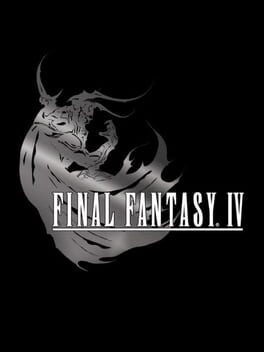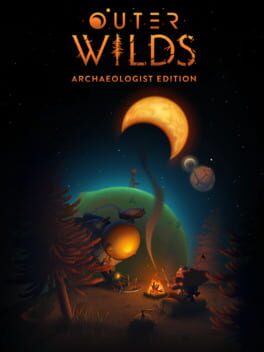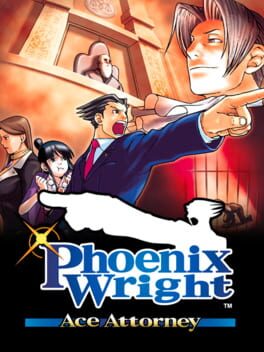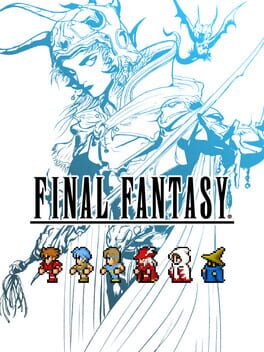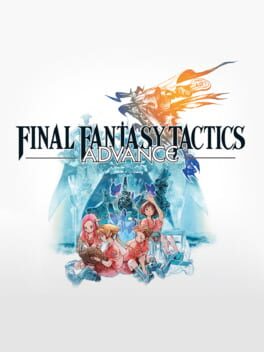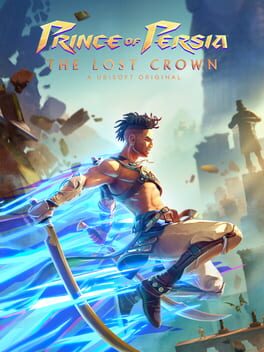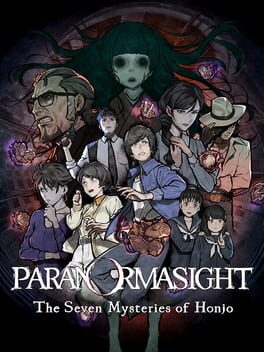Greg_Pingu
Bio
Nothing here!
Badges

Noticed
Gained 3+ followers

Roadtrip
Voted for at least 3 features on the roadmap

1 Years of Service
Being part of the Backloggd community for 1 year

Liked
Gained 10+ total review likes

Gone Gold
Received 5+ likes on a review while featured on the front page

Listed
Created 10+ public lists

Organized
Created a list folder with 5+ lists

GOTY '23
Participated in the 2023 Game of the Year Event

N00b
Played 100+ games

GOTY '22
Participated in the 2022 Game of the Year Event
Favorite Games
233
Total Games Played
012
Played in 2024
000
Games Backloggd
Recently Played See More
Recently Reviewed See More
Spoiler free review
Final Fantasy VII Rebirth is a massive RPG, the sheer quantity and quality of its content are astonishing and showcase how Square Enix invested an incredible amount of effort (and money!) to create the most grandiose and ambitious game they have ever released. This should come as no surprise considering the importance of the Final Fantasy VII franchise for the company and the public, and the resounding success of the previous chapter.
While it was expected that Rebirth would be a grand videogame, what truly surprised me is the discovery that beneath its modern, lustrous surface lies a game that seems to belong to a different time—a new entry in the serie that is reminiscent of an era of Final Fantasy that I thought was long gone. There are many aspects of Rebirth that evoke a nostalgic feeling; wonderful cities and towns, wacky minigames, a variety of subquests and different activities. In a general sense, traveling the world with a cast of compelling characters to defeat a great evil. All elements that were staples of the series but that the latest installments struggled to fully reproduce, always trying to compromise one thing for another.
In Final Fantasy VII Rebirth, it seems like nothing was compromised. It’s like Square Enix poured everything they had into this project, similar to what they did with their main title releases 20 years ago. There are no omissions, no missing elements necessitating DLCs or movies, no concept too ambitious to be included, it seems like every idea the developing team had was fully realized in this game.
The result isn't flawless by any means; there are numerous odd (sometimes inexplicable) design and narrative choices, and the game occasionally struggles to find its equilibrium while juggling so many elements at once.
One of the consequence of such abbundance, for example, is that the main story is streched so thin that even characters are often confused on what they have to do. Its’ up to the player to find an healthy balance between side and main content to avoid losing completely the narrative thread or burning out on repetitive activities. The game offers so much content that it can easily become overwhelming if you don't know how to manage it well.
One of its greatest strengths can easily turn in its biggest flaw: rewards for secondary quests and activities are, more often than not, very valuable, both in terms of narrative and gameplay. You could certainly skip most of the side activities if you're eager to progress with the main story, but would you really want to miss out on a piece of precious equipment? Or overlook a dialogue that adds depth to your party companion or unveils a crucial part of the story?
I decided to go for an almost-completitionist route from the get go, advancing only when I felt like I completed everything in a specific area (with few expetions), only because I am already invested in this world and characters and the rewards were a great payoffs for me personally. Keeping the bigger picture in mind, as well as the simpler and more streamlined story of the original, helped me navigate the extensive content of Rebirth without feeling lost when the narrative was absent for hours. Or when the story becomes progressively confusing and fragmented. Writing is excellent when it comes to characters. Not only the characterization is true to the original FF7 but is expanded and enriched in interesting ways. The game is filled with character moments that give a depth and complexity that wasn’t present in the original.
The main story, however, left me a bit perplexed. Even while reserving my final judgment until the conclusion in Part 3, I can't help but feel dissatisfied by some directorial choices that made crucial scenes confusing and diminished their emotional impact.
For all the reasons stated above, and perhaps even more so than with Part 1, I believe playing the original FF7 first greatly enhances the experience. Therefore, I will always recommend experiencing it before delving into the remake project.
Finally, although I have yet to come to a definitive judgment on the story and general pacing/progression of Rebirth, what I can say with absolute certainty though is that combat, the core element of the game, is incredibly well designed and is the perfect evolution of what we have seen in Remake. They addressed every main flaws of the previous game such as:
- More control on the character: being able to block, parry, counter attack, deal elemantal damage without additional materia, more tools to deal with flying enemies
- Building ATB faster and fill the wait between gauges using new Link Skills without ATB costs.
- Reward in switching to different characters and use ATB actions to gain bars to activate new Linked Actions.
They did an incredible job diversifying party members; each character plays significantly differently from the others, and the game encourages you through many situations and challanges to switch and try different combinations.
On the negative side, combat can feel confusing and overwhelming at times due to the multitude of options at your disposal and the visual chaos during battle scenes. Similar to Remake, it can be difficult to feel in control, especially when guarding, defending, and countering attacks. Enemy tells are often hard to read, making it easy to be overwhelmed and caught in a loop that can bring your entire party down in seconds.
Despite these problems that I hope will be addressed in the sequel, combat in Rebirth remains fun and engaging from start to finish. It stands as one of the prime examples of a combat system that effectively combines fast-paced action with in-depth tactical strategy.
Final Fantasy VII Rebirth is a massive RPG, the sheer quantity and quality of its content are astonishing and showcase how Square Enix invested an incredible amount of effort (and money!) to create the most grandiose and ambitious game they have ever released. This should come as no surprise considering the importance of the Final Fantasy VII franchise for the company and the public, and the resounding success of the previous chapter.
While it was expected that Rebirth would be a grand videogame, what truly surprised me is the discovery that beneath its modern, lustrous surface lies a game that seems to belong to a different time—a new entry in the serie that is reminiscent of an era of Final Fantasy that I thought was long gone. There are many aspects of Rebirth that evoke a nostalgic feeling; wonderful cities and towns, wacky minigames, a variety of subquests and different activities. In a general sense, traveling the world with a cast of compelling characters to defeat a great evil. All elements that were staples of the series but that the latest installments struggled to fully reproduce, always trying to compromise one thing for another.
In Final Fantasy VII Rebirth, it seems like nothing was compromised. It’s like Square Enix poured everything they had into this project, similar to what they did with their main title releases 20 years ago. There are no omissions, no missing elements necessitating DLCs or movies, no concept too ambitious to be included, it seems like every idea the developing team had was fully realized in this game.
The result isn't flawless by any means; there are numerous odd (sometimes inexplicable) design and narrative choices, and the game occasionally struggles to find its equilibrium while juggling so many elements at once.
One of the consequence of such abbundance, for example, is that the main story is streched so thin that even characters are often confused on what they have to do. Its’ up to the player to find an healthy balance between side and main content to avoid losing completely the narrative thread or burning out on repetitive activities. The game offers so much content that it can easily become overwhelming if you don't know how to manage it well.
One of its greatest strengths can easily turn in its biggest flaw: rewards for secondary quests and activities are, more often than not, very valuable, both in terms of narrative and gameplay. You could certainly skip most of the side activities if you're eager to progress with the main story, but would you really want to miss out on a piece of precious equipment? Or overlook a dialogue that adds depth to your party companion or unveils a crucial part of the story?
I decided to go for an almost-completitionist route from the get go, advancing only when I felt like I completed everything in a specific area (with few expetions), only because I am already invested in this world and characters and the rewards were a great payoffs for me personally. Keeping the bigger picture in mind, as well as the simpler and more streamlined story of the original, helped me navigate the extensive content of Rebirth without feeling lost when the narrative was absent for hours. Or when the story becomes progressively confusing and fragmented. Writing is excellent when it comes to characters. Not only the characterization is true to the original FF7 but is expanded and enriched in interesting ways. The game is filled with character moments that give a depth and complexity that wasn’t present in the original.
The main story, however, left me a bit perplexed. Even while reserving my final judgment until the conclusion in Part 3, I can't help but feel dissatisfied by some directorial choices that made crucial scenes confusing and diminished their emotional impact.
For all the reasons stated above, and perhaps even more so than with Part 1, I believe playing the original FF7 first greatly enhances the experience. Therefore, I will always recommend experiencing it before delving into the remake project.
Finally, although I have yet to come to a definitive judgment on the story and general pacing/progression of Rebirth, what I can say with absolute certainty though is that combat, the core element of the game, is incredibly well designed and is the perfect evolution of what we have seen in Remake. They addressed every main flaws of the previous game such as:
- More control on the character: being able to block, parry, counter attack, deal elemantal damage without additional materia, more tools to deal with flying enemies
- Building ATB faster and fill the wait between gauges using new Link Skills without ATB costs.
- Reward in switching to different characters and use ATB actions to gain bars to activate new Linked Actions.
They did an incredible job diversifying party members; each character plays significantly differently from the others, and the game encourages you through many situations and challanges to switch and try different combinations.
On the negative side, combat can feel confusing and overwhelming at times due to the multitude of options at your disposal and the visual chaos during battle scenes. Similar to Remake, it can be difficult to feel in control, especially when guarding, defending, and countering attacks. Enemy tells are often hard to read, making it easy to be overwhelmed and caught in a loop that can bring your entire party down in seconds.
Despite these problems that I hope will be addressed in the sequel, combat in Rebirth remains fun and engaging from start to finish. It stands as one of the prime examples of a combat system that effectively combines fast-paced action with in-depth tactical strategy.
Prince of Persia: The Lost Crown" is a solid 2D platform-action game. After 20 hours of jumps, swings, and anime-style sword clashes, I ultimately had a good time.
I’ll start with the negatives first: "The Lost Crown" effectively scratched the Metroidvania itch, but I'm not leaving with much more than that.
I feel the game didn’t introduce anything that truly stands out. It takes lessons from the greatest, and while I believe there is still merit in effectively combining the best features from the top-tier games of the genre, I wish there were more compelling reasons to choose this one over others.
One thing I am missing that I really value in this genre is the “sense of place”. I don't find the world of “The Lost Crown” to be particularly evocative or interesting. Personally, exploration is a significant factor in this type of game and, unfortunately, there's nothing that compelled me to explore or become immersed in this world. I was only moving forward, sometimes mechanically, more to make progress than moved by a sense of curiosity; there's no lore, art, characters, or area that fascinated me enough to make me want to explore further.
Still, even with nothing innovative going on, the game is fun to play thanks to the well-implemented core components (movement, powers, combat, etc.). There are moments when they combine in good harmony, and the game sings: latching onto that flying bird, then swinging on the pole to avoid spikes and landing on that soldier to deliver a potent blow.
Boss fights are the highlight of the game. They are thrilling and spectacular, and while they may appear challenging at first, the game provides ample opportunities to make mistakes or recover health. Mastering the enemy's moveset is not absolutely necessary; simply learning to avoid their strongest attacks suffices. It's nice that you can retry right away—they never impede progression significantly, yet they offer enough challenge and excitement to feel truly rewarding and adrenaline-inducing.
Powers are also very well implemented. Nothing stands out as original or innovative in the genre but the power progression is well balanced and each is useful for both platform and combat.
However, despite this solid foundation, I can’t help but feel that the game shines only in small portions; clever platforming puzzles and exciting fights create engaging moments that, sadly, are diluted in the overall experience. It takes a while to reach a good level of mobility. That combined with scarse teleports and the some unintersting areas, make the exploration of the first 7-8 hourse quite dull.
Finally, it’s important to note that the game is still a little buggy. Overall, the game ran well. I ran into gameplay-affecting bugs a few times, but unluckily they came up at the worst moments, like right after boss fights or long backtracking sections. This game definitely needed some more time in the oven.
I’ll start with the negatives first: "The Lost Crown" effectively scratched the Metroidvania itch, but I'm not leaving with much more than that.
I feel the game didn’t introduce anything that truly stands out. It takes lessons from the greatest, and while I believe there is still merit in effectively combining the best features from the top-tier games of the genre, I wish there were more compelling reasons to choose this one over others.
One thing I am missing that I really value in this genre is the “sense of place”. I don't find the world of “The Lost Crown” to be particularly evocative or interesting. Personally, exploration is a significant factor in this type of game and, unfortunately, there's nothing that compelled me to explore or become immersed in this world. I was only moving forward, sometimes mechanically, more to make progress than moved by a sense of curiosity; there's no lore, art, characters, or area that fascinated me enough to make me want to explore further.
Still, even with nothing innovative going on, the game is fun to play thanks to the well-implemented core components (movement, powers, combat, etc.). There are moments when they combine in good harmony, and the game sings: latching onto that flying bird, then swinging on the pole to avoid spikes and landing on that soldier to deliver a potent blow.
Boss fights are the highlight of the game. They are thrilling and spectacular, and while they may appear challenging at first, the game provides ample opportunities to make mistakes or recover health. Mastering the enemy's moveset is not absolutely necessary; simply learning to avoid their strongest attacks suffices. It's nice that you can retry right away—they never impede progression significantly, yet they offer enough challenge and excitement to feel truly rewarding and adrenaline-inducing.
Powers are also very well implemented. Nothing stands out as original or innovative in the genre but the power progression is well balanced and each is useful for both platform and combat.
However, despite this solid foundation, I can’t help but feel that the game shines only in small portions; clever platforming puzzles and exciting fights create engaging moments that, sadly, are diluted in the overall experience. It takes a while to reach a good level of mobility. That combined with scarse teleports and the some unintersting areas, make the exploration of the first 7-8 hourse quite dull.
Finally, it’s important to note that the game is still a little buggy. Overall, the game ran well. I ran into gameplay-affecting bugs a few times, but unluckily they came up at the worst moments, like right after boss fights or long backtracking sections. This game definitely needed some more time in the oven.
Paranormasight is a well-executed visual novel that excels in telling an eerie yet captivating story. Amazing visuals and soundtrack are what make this game truly special; they create a unique atmosphere that entices the player from the very beginning. Speaking of that, the prologue is absolutely brilliant and masterfully sets the tone for the entire game. From then on, the story proceeds tightly without any major hiccups, reaching a satisfying ending without dragging on too much.
However, I can't help but notice how the game falls somewhat short compared to the first excellent hours, especially in regards to gameplay and interaction. Initially, the game presents interesting mechanics, twists, and fourth-wall-breaking puzzles that excited me and set the expectations for what was about to come. Sadly, those moments rarely occurred again during the course of the story. Paranormasight "limited" itself to a classic 2D visual novel with static setpieces and progression tied to often confusing dialogue choices. Nonetheless, a very good and exciting classic visual novel.
However, I can't help but notice how the game falls somewhat short compared to the first excellent hours, especially in regards to gameplay and interaction. Initially, the game presents interesting mechanics, twists, and fourth-wall-breaking puzzles that excited me and set the expectations for what was about to come. Sadly, those moments rarely occurred again during the course of the story. Paranormasight "limited" itself to a classic 2D visual novel with static setpieces and progression tied to often confusing dialogue choices. Nonetheless, a very good and exciting classic visual novel.

